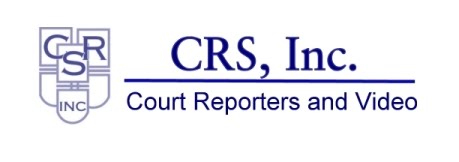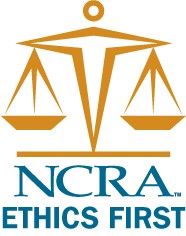Monday, October 31, 2011
Wireless Realtime in the Palm of Your Hand
NOW get realtime on your iPad or iPod. The myView Viewer for clients is available free of charge in the Apple App Store.
Friday, October 21, 2011
CRS is proud to be an Ethics First Firm with National Court Reporters Association
The Ethics First program was created by the National Court Reporters Association as a positive and proactive effort to encourage reporters, firms, and the clients they serve to promote the impartiality and the neutrality of the reporting profession and avoid inappropriate gift giving and gift acceptance. When used correctly, the Ethics First trademark is designed to instill public confidence in and support for the court reporting profession.
Tuesday, October 4, 2011
S.F. Eliminating Court-Provided Reporters in Most Civil Cases
COURT REPORTING SERVICES IN CIVIL CASES
Effective October 3, 2011, the services of Official Court Reporters will not normally be available during regular court hours in the civil departments of San Francisco Superior Court located at the Civic Center Courthouse.
When the services of an Official Court Reporter are not available for a hearing or trial in a civil case, a party may arrange for the presence of a certified shorthand reporter to serve as an official pro tempore reporter. It will be that party’s responsibility to pay the reporter’s fee for attendance at the proceedings, but the expense may be recoverable as part of the costs, as provided by law. [Rule 2.956(c), Cal. Rules of Court]
Call CRS for the most important part of your case, the trial. You will be sure that our reporters are the best in the business and experienced in handling all aspects of court work.
Effective October 3, 2011, the services of Official Court Reporters will not normally be available during regular court hours in the civil departments of San Francisco Superior Court located at the Civic Center Courthouse.
When the services of an Official Court Reporter are not available for a hearing or trial in a civil case, a party may arrange for the presence of a certified shorthand reporter to serve as an official pro tempore reporter. It will be that party’s responsibility to pay the reporter’s fee for attendance at the proceedings, but the expense may be recoverable as part of the costs, as provided by law. [Rule 2.956(c), Cal. Rules of Court]
Call CRS for the most important part of your case, the trial. You will be sure that our reporters are the best in the business and experienced in handling all aspects of court work.
DepoView for Video/Text Synchronization
When CRS synchronizes your videotaped depositions with transcripts and exhibits, we export to DepoView. DepoView allows you to create and save video clips, search transcripts, and export synchronized video depositions to other programs. DepoView is the easiest way to review the deposition, search important segments, and extract key testimony from your video transcript. Click picture below for an online tutorial.
Friday, September 30, 2011
Is Your Depo Getting you in Hot Water with the IRS?
A message from the president of the Deposition Reporters Association.
Sunday, August 21, 2011
Fear the Middleman
Why pay more to a "national" court reporting firm for your local depositions?
Truth is, "national" court reporting firms DO NOT have court reporters on staff in every locale across the United States or the world. Instead, they subcontract with local reporters. You can hire that same local reporter directly and save money in most cases. How do you save money by hiring locally? Marketing on a national scale is expensive. Local reporters don't have that expense. Higher operating costs and an additional layer of profit result in higher prices for the consumer, YOU.
You can save money by hiring locally for your out-of-state depositions too.
Contact CRS for all your out-of-town depositions. With our court reporter, videographer and interpreter contacts and knowledge of the court reporting industry, rest assured that you're getting a quality referral. CRS offers the convenience of one call does it all, just like the "national" firms, while avoiding the pitfalls of third-party contracting and other unethical practices that not only undermine the integrity of your court records, but could render your transcript void in some jurisdictions.
Click here for a more in-depth look at the benefits of avoiding the "national" middleman markup and hiring local reporters.
Truth is, "national" court reporting firms DO NOT have court reporters on staff in every locale across the United States or the world. Instead, they subcontract with local reporters. You can hire that same local reporter directly and save money in most cases. How do you save money by hiring locally? Marketing on a national scale is expensive. Local reporters don't have that expense. Higher operating costs and an additional layer of profit result in higher prices for the consumer, YOU.
You can save money by hiring locally for your out-of-state depositions too.
Contact CRS for all your out-of-town depositions. With our court reporter, videographer and interpreter contacts and knowledge of the court reporting industry, rest assured that you're getting a quality referral. CRS offers the convenience of one call does it all, just like the "national" firms, while avoiding the pitfalls of third-party contracting and other unethical practices that not only undermine the integrity of your court records, but could render your transcript void in some jurisdictions.
Click here for a more in-depth look at the benefits of avoiding the "national" middleman markup and hiring local reporters.
Saturday, August 20, 2011
Beware of the "Usual Stipulations"
Here in Northern California court reporters are always faced with lawyers from Southern California making a stipulation at the end of a deposition, relieving the court reporter of his or her obligations under the Code of Civil Procedure.
Our normal procedure is to always follow the code, which means the witness has 30 days to read his or her counsel's copy instead of the original and send an errata sheet to the court reporter. The original remains in our office for 30 days and after that, any corrections received are placed with the original, sealed, and sent to the noticing party for safekeeping until time of trial. These procedures ensure the integrity of the original.
Click here for a thoughtful article by Steven D. Archer, a partner in the Los Angeles office of Robins, Kaplan, Miller & Ciresi LLP on what it means to make the "usual stipulations" in a deposition.
Our normal procedure is to always follow the code, which means the witness has 30 days to read his or her counsel's copy instead of the original and send an errata sheet to the court reporter. The original remains in our office for 30 days and after that, any corrections received are placed with the original, sealed, and sent to the noticing party for safekeeping until time of trial. These procedures ensure the integrity of the original.
Click here for a thoughtful article by Steven D. Archer, a partner in the Los Angeles office of Robins, Kaplan, Miller & Ciresi LLP on what it means to make the "usual stipulations" in a deposition.
Tuesday, August 2, 2011
New! Realtime TV viewer
We now have the revolutionary StenoCastTV for instant-on real-time, no com ports to configure, no baud rates, no tokens! Ask for a free hands-on demo today.
 |
| Click for Demo |
Could your court reporter's gifts put you at higher risk for an IRS audit?
From Save Our Court Records:
The Law Firm of Hanson Bridgett Offers Legal Opinion Regarding Tax Implications!
Many court reporting firms have been promising valuable incentives to law firm staff in exchange for booking depositions. DRA and CCRA, two prominent court reporting associations, have retained the law firm of Hanson Bridgett to review the tax implications of these incentives and have shared the results for wide distribution.
According to the Hanson Bridgett analysis, law firms, attorneys, and staff should be aware that offers of such incentives raise potentially serious tax consequences for law firms and their employees. As Hanson Bridgett writes:
Court Reporter vs. Machine
An open letter by Deposition Reporters Association President Lisa Michaels on the differences between a professional court reporter and a tape recorder.
Subscribe to:
Posts (Atom)






